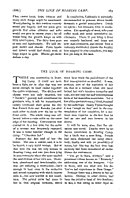
The California gold rush (1848–1855) was a gold rush that began on January 24, 1848, when gold was found by James W. Marshall at Sutter's Mill in Coloma, California. The news of gold brought approximately 300,000 people to California from the rest of the United States and abroad. The sudden influx of gold into the money supply reinvigorated the American economy; the sudden population increase allowed California to go rapidly to statehood in the Compromise of 1850. The Gold Rush had severe effects on Native Californians and accelerated the Native American population's decline from disease, starvation, and the California genocide.
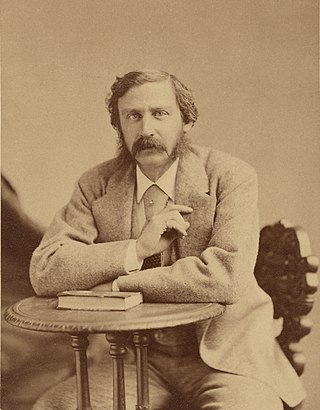
Bret Harte was an American short story writer and poet best remembered for short fiction featuring miners, gamblers, and other romantic figures of the California Gold Rush. In a career spanning more than four decades, he also wrote poetry, plays, lectures, book reviews, editorials, and magazine sketches.

Thomas Starr King, often known as Starr King, was an American Universalist and Unitarian minister, influential in California politics during the American Civil War, and Freemason. Starr King spoke zealously in favor of the Union and was credited by Abraham Lincoln with preventing California from becoming a separate republic. He is sometimes referred to as "the orator who saved the nation".
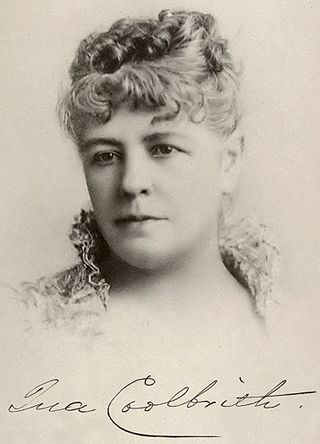
Ina Donna Coolbrith was an American poet, writer, librarian, and a prominent figure in the San Francisco Bay Area literary community. Called the "Sweet Singer of California", she was the first California Poet Laureate and the first poet laureate of any American state.

Bohemianism is a social and cultural movement that has, at its core, a way of life away from society's conventional norms and expectations. The term originates from the French bohème and spread to the English-speaking world. It was used to describe mid-19th-century non-traditional lifestyles, especially of artists, writers, journalists, musicians, and actors in major European cities.

"The Outcasts of Poker Flat" (1869) is a short story written by author of the American West Bret Harte. An example of naturalism and local color of California during the first half of the nineteenth century, the story was first published in January 1869 in the magazine Overland Monthly. It was one of two short stories which brought the author national attention.
The Golden Era was a 19th-century San Francisco newspaper. The publication featured the writing of Mark Twain, Bret Harte, Charles Warren Stoddard, Fitz Hugh Ludlow, Adah Isaacs Menken, Ada Clare, Prentice Mulford, Dan De Quille, J. S. Hittell and some women such as Frances Fuller Victor. Stoddard recalled the newspaper as "the chief literary organ west of the Rocky Mountains".
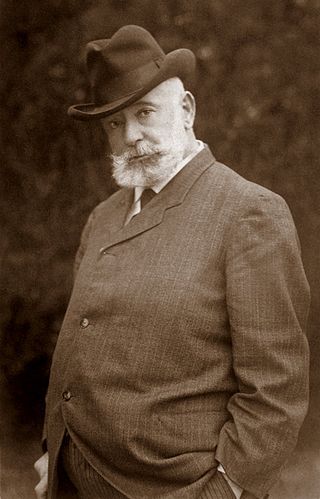
Charles Warren Stoddard was an American author and editor best known for his travel books about Polynesian life.
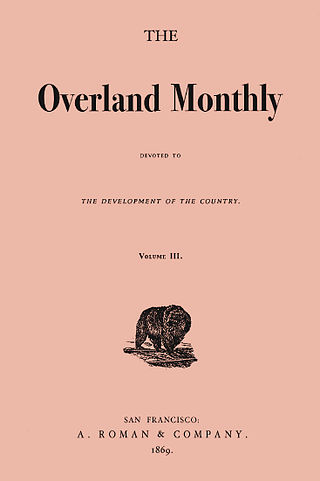
The Overland Monthly was a monthly literary and cultural magazine, based in California, United States. It was founded in 1868 and published between the second half of the 19th century and the first half of the 20th century.

James Ripley Osgood (1836–1892) was an American publisher in Boston. He was involved with the publishing company that became Houghton Mifflin.

"The Heathen Chinee", originally published as "Plain Language from Truthful James", is a narrative poem by American writer Bret Harte. It was published for the first time in September 1870 in the Overland Monthly. It was written as a parody of Algernon Charles Swinburne's Atalanta in Calydon (1865), and satirized anti-Chinese sentiment in northern California.
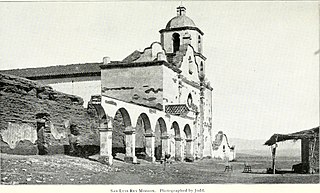
The history of slavery in California began with the enslavement of Indigenous Californians under Spanish colonial rule. The arrival of the Spanish colonists introduced chattel slavery and involuntary servitude to the area. Over 90,000 Indigenous peoples were forced to stay at the Spanish missions in California between 1770 and 1834, being kept in well-guarded mission compounds. This has been described as de facto slavery, as they were forced to work on the mission's grounds amid abuse, malnourishment, overworking, and a high death rate. Indigenous girls were taken from their parents to be housed in guarded dormitories known as monjeríos for conversion to Catholicism and control over their sexuality.

Dutch Flat is a small unincorporated community and census-designated place (CDP) in Placer County, California, United States, about 30 miles (48 km) northeast of Auburn along Interstate 80. It was founded by German immigrants in 1851 and was once one of the richest gold mining locations in California. Dutch Flat is now registered as a California Historical Landmark.

Charles Henry Webb was an American poet, author and journalist. He was particularly known for his parodies and humorous writings.
The Californian was a San Francisco literary newspaper published weekly from May 28, 1864 until February 1, 1868.
The Luck of Roaring Camp is a 1911 Australian feature-length film directed by W. J. Lincoln now considered a lost film. It was highly regarded in its day, in part because it was based on a play that was popular with audiences.
The Tales of the Argonauts is a volume of short stories published by Bret Harte in 1875. The title is sometimes loosely applied to all Harte's stories of early California.
Tennessee's Partner is a short story by Bret Harte, first published in the Overland Monthly in 1869, which has been described as "one of the earliest 'buddy' stories in American fiction." It was later loosely adapted into four films.

Two Men of Sandy Bar is a 1916 American silent Western Melodrama directed by Lloyd B. Carleton and starring Hobart Bosworth, Gretchen Lederer along with Emory Johnson.
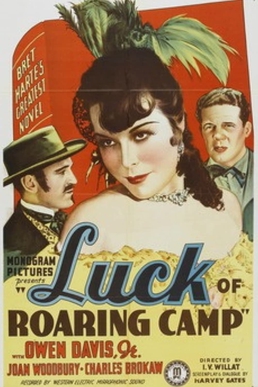
Luck of Roaring Camp is a 1937 American western film directed by Irvin Willat and starring Owen Davis, Charles Brokaw and Joan Woodbury. It is based on the 1868 story The Luck of Roaring Camp by Bret Harte. It was shot at the Iverson Ranch in California.
